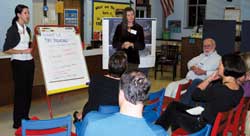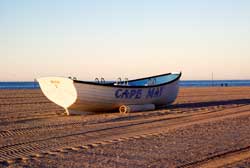Landscape Architecture students help revitalize Cape May’s parks and trails
| CONTACT: James Duffy <duffyj@temple.edu> 215-468-8108 |
| Students in the Department of Landscape Architecture and Horticulture’s Senior Design Studio have circled an important date on their calendar in December — and it’s not the one you might be thinking.
On Thursday, Dec. 10, the 27 students will present their design concepts for Cape May, New Jersey’s Rotary Park, Harborview Park and a new biking and walking trail linking all of the historical shore point’s unique features. This fall, the city undertook an ambitious plan to revitalize several of its parks and create a new pedestrian and biking trail that will highlight and educate visitors about the city’s ecological sites, historic structures, unique neighborhoods and cultural landmarks. Rather than seek out a professional firm, however, the project was developed as a learning experience for the Landscape Architecture Senior Studio course, a project that the students are approaching with the utmost professionalism |
 Landscape Architecture and Horticulture students Kali Whyte and Denise Wood gather community feedback at a public meeting held in October as part of a project to revitalize several of Cape May's parks and create a new pedestrian and biking trail.
|
|
“The class is currently working in three project teams, and within each team we’ve had groups of two developing design concepts based on goals and objectives developed by the city and feedback from the community survey and public meeting that was held in October,” said Landscape Architecture Adjunct Assistant Professor Stuart Appel who, with Lecturer in Landscape Architecture Bess Wellborn Yates, is overseeing the year-long student project.
|
|
 Photo Courtesy: Cape May Magazine
Cape May is a National Historic Landmark located between the Atlantic Ocean and Delaware estuary.
Related Links
|
At the upcoming public meeting, the students will present three to six concepts for the three parks and work with small groups of community members to gain feedback that can be incorporated into final designs this spring, said Appel./>
“Many of the projects that we work on are hypothetical, but with this project you are responding to the needs of the client; the client drives the end product,” said Landscape Architecture Senior Robin Irizarry. “It’s a hands-on, real world project for a real community that has the intention of implementing our designs.” |
|
“The interpretive trail will take pedestrians and bike riders to all of the sites in Cape May,” said Landscape Architecture Senior Rebecca Kagle. “The city has such a commitment to historical and ecological preservation; we want to get people out experiencing Cape May in a new, holistic way.” |
|